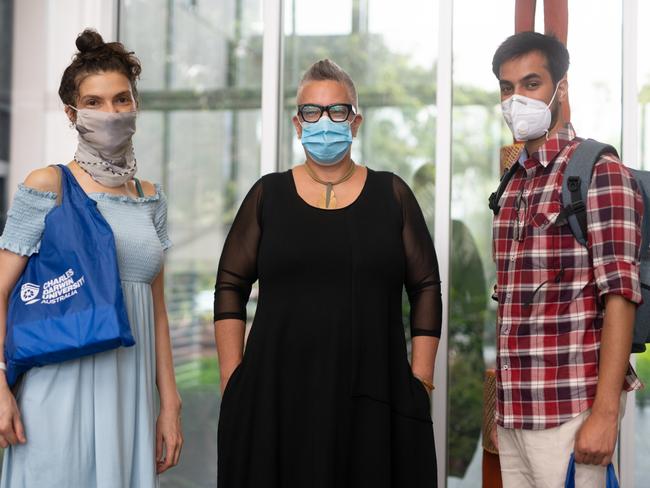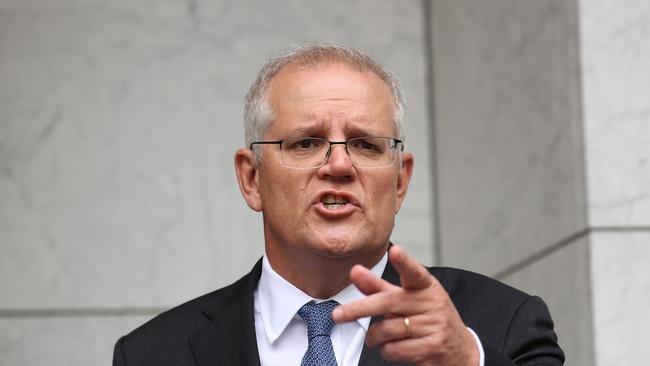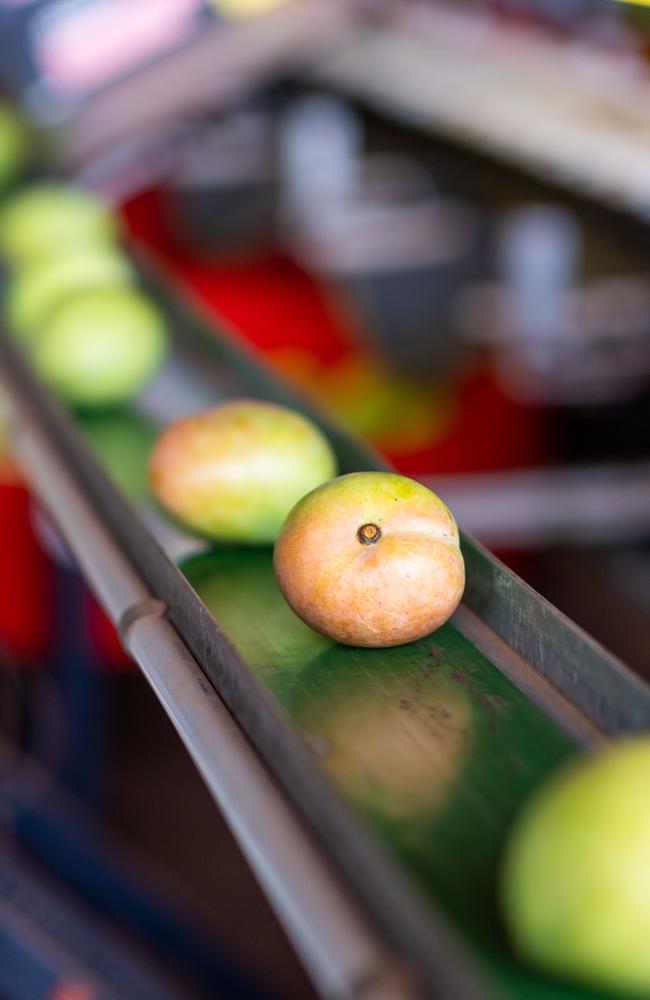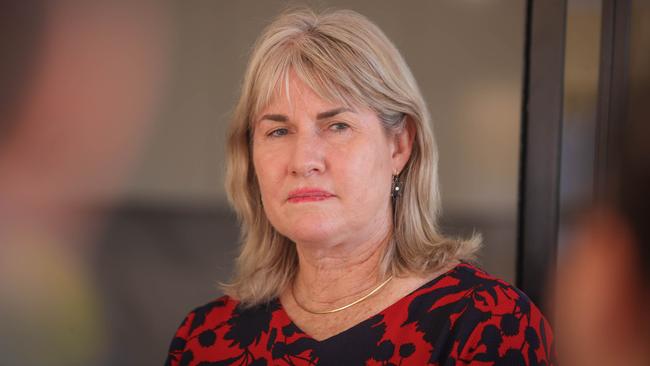CDU opens tender for student accommodation
Charles Darwin University has put out expressions of interest for the design, develop and operation of new student accommodation.
Northern Territory
Don't miss out on the headlines from Northern Territory. Followed categories will be added to My News.
EXPRESSIONS of interest are open for organisations to design, develop and operate new accommodation for more than 400 international and domestic students by 2028.
The tender, put out by Charles Darwin University, is for purpose-built accommodation or the provision of housing from existing or redeveloped buildings in the Darwin CBD to house students attending the new campus. CDU Vice-Chancellor Scott Bowman said the university estimated that between 250 and 300 beds would be needed by 2025 and a further 120 by 2028.
The campus is due to be complete by 2024. Construction is well underway, with a Comansa hammerhead tower crane erected at the site late last year.
“CDU is looking to expand its current student accommodation options over the coming years to better cater to the needs of the student community in the Territory,” Professor Bowman said.
He said some of the projected demand could be met through developing and operating facilities on the site of the new CBD campus but additional capacity would be required through new facilities on private land or by leasing rooms in existing or re-purposed facilities.
“We know that many students have struggled to find suitable accommodation options close to the city and the university,” Prof Bowman said.
“As we see student numbers increase, particularly from international and domestic students, demand for student accommodation will only continue and we don’t want that to be a barrier to study.
“Arriving in Australia as an international student can be incredibly daunting for many students, so this is about supporting students with that transition and ensuring they have adequate housing to succeed while they are at university.”
CDU is exploring expanding student accommodation options in Alice Springs.
Prof Bowman said one of the university’s focuses was to grow its international student cohort.
“We’re looking over the next two or three years to double the number of international students,” he said.
“We’ve got about 2000. I would hope over the next two or three years we could get that up to 4000 and that’s important when we go into opening the city campus.”
He was confident CDU could attract the students through the NT’s uniqueness and multicultural community.
“One thing we want to do is to say Darwin is a capital city, come and study in a capital city but also have all the advantages of being in a regional city as well,” he said.
“One of the things that international students really want to be close to is their own communities, so we are now starting to develop really good communities in Darwin of Indian people, Bangladeshi people, Nepalese people.
“We really need to get involved with them and use them to promote the university.” Organisations can register their interest in the EOI at tenderlink.com/cdu.
Uni reinstates pharmacy course
CHARLES Darwin University will reinstate pharmacy training after axing a bachelor degree in 2019.
CDU is aiming to offer a two-year Master of Pharmacy course on a graduate entry basis for students who hold a degree in health sciences from 2023, subject to approval by the Australian Pharmacy Council (APC). The initial intake will be 30 students.
CDU Senior Lecturer in Pharmacy Heather Volk said the course would help address the shortage of pharmacists in the NT.
“We don’t have enough pharmacists here and getting the right people with the right skills is important to the health of the NT,” Ms Volk said.
“The employment prospects for pharmacists are 100 per cent and they’ll receive well above average pay because they’re in high demand.”.
She said Australia-wide, there are 88 pharmacists per 100,000 people but the NT has only 63 per 100,000.
Graduates complete a 12-month internship before they can register as a pharmacist.
CDU’s Bachelor of Pharmacy was established in the early 2000s but cut in 2019 due to low course enrolments.
International students to be welcomed
MORE than 130 international vaccinated students will be welcomed to the Territory by Charles Darwin University (CDU) in the coming weeks.
The announcement comes after the federal government said that vaccinated international students can come to Australia without having to quarantine.
CDU will have new and returning international students walk through their doors from a variety of countries such as India, Nepal, Sri Lanka, Pakistan, China, Canada, and the UK.
Spanish-born Canadian student Macarena Santos began her Australian study journey in August 2021 when she enrolled in the Master of Teaching degree at CDU online.
She joined hoping one day she could join her classmates on-campus when borders reopen.
Now fresh on the scene in Darwin, Ms Santos feels that being able to come to study in Australia is one of the most important steps in her life.

“The Northern Territory is one of the most interesting parts of Australia, with an old and fascinating history as well as a bright future,” Ms Santos said.
“CDU offers opportunities for all types of students, whether we are studying online or in person. Every unit I have studied so far has been interesting and I feel better prepared as a student and as a future teacher.”
EARLIER: THE NT Farmers Association and NT government have welcomed temporary Commonwealth incentives to help bolster the return of “hugely important” backpackers and international students.
But there are concerns that the scheme will end before key crops for Territory farmers can be harvested.
Fruit pickers in the Territory have been a rare commodity since the pandemic began, with key labour shortages on mango orchards and melon farms.
Prime Minister Scott Morrison announced a $55m package on Wednesday which will rebate visa application fees for 175,000 international students and backpackers.
Mr Morrison said the new incentives were the result of a “tight labour market”, with unemployment nationwide at 4.6 per cent.
“What we’ll be doing is we will be rebating the visa application fees from all (international students) who arrive today – today, and going forward – for students over the next eight weeks, and that is a fee of some $630,” he said.

Backpackers who arrive in the next 12 weeks will get a similar rate.
Mr Morrison said the changes were aimed at aiding “in our agricultural sector, in our hospitality sector, and so many of the other parts of the economy that rely on that labour”.
Another $3m would be spent promoting the country globally through an ad campaign with Tourism Australia.
The rebates are expected to benefit the Territory’s $172m international education sector and its $1.2b agriculture industry.
NT Farmers Association chief executive Paul Burke welcomed the announcement but said the 12-week time frame wasn’t enough.
“Unfortunately, the attraction program for backpackers will end prior to the start of our mango harvest season.”

“A permanent and comprehensive campaign to attract backpackers and students to the industry is needed to ensure that farmers can employ a mobile and engaged workforce throughout the year.”
Mr Burke said 2022 would still be “another extremely difficult year” and more schemes were needed to ensure produce can be harvested.
Chief Minister Michael Gunner welcomed the additional supports, saying it would help replenish the 4300 international student enrolments in the Territory.
“We welcome today’s announcement as it is good news for the Territory’s international education, hospitality and agriculture sectors.”
When asked whether the NT government were planning any further initiatives to bolster the labour market, Mr Gunner said his government had provided a range of schemes.
New laws to add time, cost to building projects
NEW reforms which mean complex construction builds need to be independently reviewed by a third party will come into force at the end of this month.
But the Infrastructure, Planning and Logistics Eva Lawyer couldn’t say how much this would cost, or how long it would delay projects.
The new rules apply to any construction project deemed as ‘complex’, including any structure over three storeys, but won’t apply to most detached home construction projects.
Ms Lawler said the introduction of so-called ‘Independent Third-Party Review of Structural Designs’ would add extra time to the approval process, but would be preferable to having a structure needing rectification after being built.

“It’s time well spent if you can do it at the front end during that design work,” she said.
The review by a third party will need to be completed before a building permit can be issued by a building certifier.
Engineers Australia’s Dr Elisha Harris said the organisation was supportive of the new laws.
“We believe it is a positive first step in implementing the recommendations of the Building Confidence Report,” Dr Harris said.
She said the new rules only applied if a construction job met two or more requirements on a list of complexity requirements.
“Medium complexity buildings require review,” she said.
“So a childcare centre, for instance, or an aged care facility, or a hospital type facility where people would potentially need assistance to leave the building.”




